Graduate Certificate in Early Modern Studies
All incoming and current UCLA graduate students who are pursuing an M.A. or Ph.D. are eligible to apply for this certificate program, which is designed for students who are in the early stages of their graduate education. The program offers opportunities to explore the increasingly transnational and interdisciplinary nature of early modern studies. Students who are accepted into the program will complement their training in traditional disciplines with specially designated comparative courses. Aside from gaining a certificate for completion of this coursework, students in the program will have access to unique fellowship and mentoring opportunities. With two centers and numerous faculty members working in a range of disciplines, UCLA is uniquely positioned to provide connections among early modern scholars working across the humanities and humanistic social sciences.
The Graduate Certificate in Early Modern Studies is an Interdisciplinary Certificate for Matriculated Graduate Students that has been approved by and adheres to the criteria set by the UCLA Graduate Council. Evidence of a student’s satisfactory completion of a certificate program will be provided by the department or IDP. As non-degree programs, evidence of completion of an interdisciplinary certificate program will not appear on the student’s official transcript.
This interdisciplinary certificate is administered by the UCLA Center for 17th- & 18th-Century Studies.
Certificate Requirements
- Successful completion (3.0 GPA or above) of four 200-level graduate seminars on interdisciplinary early modern topics, pre-approved by the Certificate Core Committee. View our list of 2024–25 approved seminars.
- One 25-page paper on an early modern topic of interdisciplinary breadth. The Center for 17th- & 18th-Century Studies awards competitive summer mentorships that provide financial support in the form of a $6,000 award to participating Certificate program students for the completion of this requirement, based on the strength of their proposed projects. Both the proposed research topic and the completed paper are subject to approval by the Certificate Core Committee. Learn more about the summer mentorship guidelines.
- Attendance at and brief responses to at least three affiliated lectures held at UCLA or the Clark Library, located off-campus in the historic West Adams District.
How to apply
Admission to the certificate program is competitive. Applications are reviewed once a year. The next application deadline is May 7, 2025.
Applicants are required to submit:
- A statement of purpose expressing your qualifications for and interest in this interdisciplinary program of graduate study. The statement should be no longer than 300 words.
- One letter of recommendation from your faculty advisor or department chair. The letter should be typed on departmental letterhead and signed. The letter must be e-mailed to the address below by the faculty member or sent directly to the Center in a sealed envelope.
- A copy of your current transcript. If the fall quarter is your first academic term at UCLA, please submit a transcript from the last university you attended.
For more information, please contact:
Jeanette LaVere, Manager of Programs & Development
UCLA Center for 17th- & 18th-Century Studies
345 Portola Plaza, 3314 Rolfe Hall
Los Angeles, CA 90095-1404
E-mail: jlavere@humnet.ucla.edu
Phone: 310-206-8552
Fax: 310-206-8577
Frequently Asked Questions
Pre-Approved Seminars
- I’m not currently in the certificate program, but I’ve already taken some of the seminars on the pre-approved list. If I am accepted into the certificate program, can the seminars I’ve already taken be retroactively counted towards my requirement?
No. The Certificate Core Committee will only count towards your requirement seminars from the pre-approved list that you take AFTER you have been accepted into the certificate program. - I found a 200-level graduate seminar that I think would be perfect for the certificate program, but it’s not on the pre-approved list. Can I petition to have it included on the list?
Yes. You may petition the Certificate Core Committee to have 200-level, 4.0 unit graduate seminars considered for the pre-approved list. You must contact Jeanette LaVere at jlavere@humnet.ucla.edu well BEFORE the seminar is being offered, as the Certificate Core Committee will not approve a seminar after it has begun. Provide as much information about the seminar as possible, including a syllabus, if available. Please allow one week for a decision. You will be notified via e-mail of the committee’s decision, and if approved, the seminar will be added to the pre-approved list posted on this website. - A seminar on the pre-approved list is offered as Satisfactory/Unsatisfactory or letter grade. Do I have to take the seminar for a letter grade?
Yes. In order for seminars to count towards certificate program requirements, they must be 200-level, 4.0 unit seminars taken for a letter grade.
Responses to Affiliated Programs
- I attended a conference hosted by the Center for 17th- & 18th-Century Studies and Clark Library, and I would like to count it towards my certificate requirements. How do I do this?
Responses should be submitted to Jeanette LaVere at jlavere@humnet.ucla.edu within one week of attending the program. Responses should include your name; the name, date, and location of the program; and a brief (one to two pages) description of the program, including why you attended the program and how it is connected to your own research. If you are unsure if attendance at and a response to a particular lecture, conference, or other event will be counted towards your certificate requirement, please contact Jeanette well in advance.
Summer Mentorship
- I am not in the certificate program. Can I apply for the summer mentorship offered by the certificate program?
No. Only students who are accepted into the Graduate Certificate in Early Modern Studies program are eligible to apply for the summer mentorship. These students must meet several eligibility requirements in order to be awarded a summer mentorship. - I am in the certificate program, and I want to apply for the another summer award. May I have another summer award and a summer mentorship provided by the certificate program at the same time?
No. A summer mentorship, whether awarded by the certificate program or another UCLA entity, should be considered your primary summer activity; it is not permitted, therefore, to have two summer mentorships at the same time. - I am in the certificate program, and I received a summer mentorship last summer. Am I eligible to apply for another summer mentorship though the certificate program?
No. The certificate program provides a maximum of one summer mentorship. - I am in the certificate program, and I have advanced to candidacy. Am I eligible to apply for a summer mentorship?
No. If you have already advanced to candidacy, you are not eligible to apply for a summer mentorship. - I am in the certificate program, but I did not apply for/was not awarded a summer mentorship. Can I still earn the certificate?
Yes. The Certificate Core Committee recognizes that there are many funding opportunities available to students, so a summer mentorship is not a requirement of the certificate program. As long as a student in the certificate program successfully completes all of the items listed under “Certificate Requirements,” she/he can earn the certificate. To satisfy the certificate program’s 25-page paper requirement, students who do not receive a summer mentorship but wish to earn the certificate must identify and work with a faculty mentor to develop their paper, have their paper proposal approved by the Certificate Core Committee, and submit their completed paper with a letter from their mentor to the committee for final approval. Students who do not receive a summer mentorship are not required to present their 25-page paper at a work-in-progress session with their faculty mentor present but may elect to do so.
2024–25 Graduate Certificate Students
Rachel Glaser
 Christian Reyes is a PhD student in the Department of Spanish and Portuguese. Prior to beginning his PhD, he completed his B.A. in History at UC Irvine, his JD/MBA at Southwestern Law School, and his M.A. in Latin American Studies at UCLA. He is interested in the construction of race in early modern Spain’s literature and culture. In particular, he is interested in representations of Blackness and non-white peoples in early modern Spain’s literary and theatrical production and the effects such representations had on the racialization of Black Africans, Muslims, and Indigenous peoples of the Americas.
Christian Reyes is a PhD student in the Department of Spanish and Portuguese. Prior to beginning his PhD, he completed his B.A. in History at UC Irvine, his JD/MBA at Southwestern Law School, and his M.A. in Latin American Studies at UCLA. He is interested in the construction of race in early modern Spain’s literature and culture. In particular, he is interested in representations of Blackness and non-white peoples in early modern Spain’s literary and theatrical production and the effects such representations had on the racialization of Black Africans, Muslims, and Indigenous peoples of the Americas.
2023–24 Graduate Certificate Students
Sunhui Choi
Diana Echeverria Palencia is a Ph.D. student in the English department. Prior to beginning her program at UCLA, she earned her M.A. in English at California State University–Los Angeles. For several years she worked as an English/ELD teacher at secondary schools in Los Angeles and New York City. Diana is primarily interested in studying non-Anglo colonialism and its influence on Anglo literary culture during the early modern period. With a particular emphasis on the transmission of Spanish texts into English culture, she considers how English writers help mold the national imaginary while emulating Spain’s empire. Her transnational and multilingual approach to her research is heavily informed by growing up in a Spanish speaking household and her time studying in France.
Prior to beginning her program at UCLA, she earned her M.A. in English at California State University–Los Angeles. For several years she worked as an English/ELD teacher at secondary schools in Los Angeles and New York City. Diana is primarily interested in studying non-Anglo colonialism and its influence on Anglo literary culture during the early modern period. With a particular emphasis on the transmission of Spanish texts into English culture, she considers how English writers help mold the national imaginary while emulating Spain’s empire. Her transnational and multilingual approach to her research is heavily informed by growing up in a Spanish speaking household and her time studying in France.
Earl John Hernandez
Adela McKay Villegas
Sarah Ortiz-Monasterio is a first year M.A.-Ph.D. student in the UCLA Department of Art History. She earned her Bachelor of Arts degree in Art History and English Literature from the University of Miami and her Master of Philosophy degree in Latin American Studies from the University of Cambridge. Her MPhil dissertation entitled “Hide and Seek: Hidden Images in Mexican Modernist Art (Diego Rivera, Saturnino Herrán, and Leonora Carrington)” is an examination and analysis of images in artwork by the aforementioned artists that emblematize the fortitude of an innate Mexican identity and modernity. She has interned at the Philadelphia Museum of Art and the Norton Museum of Art, as well as held positions in cultural institutions in Palm Beach, Florida. Sarah’s exposure from a young age to early modern Indigenous and modern Mexican art and architecture has inspirited her to study how and why early modern Indigenous design and construction have informed and impacted modern Mexican architectural practices.
Department of Art History. She earned her Bachelor of Arts degree in Art History and English Literature from the University of Miami and her Master of Philosophy degree in Latin American Studies from the University of Cambridge. Her MPhil dissertation entitled “Hide and Seek: Hidden Images in Mexican Modernist Art (Diego Rivera, Saturnino Herrán, and Leonora Carrington)” is an examination and analysis of images in artwork by the aforementioned artists that emblematize the fortitude of an innate Mexican identity and modernity. She has interned at the Philadelphia Museum of Art and the Norton Museum of Art, as well as held positions in cultural institutions in Palm Beach, Florida. Sarah’s exposure from a young age to early modern Indigenous and modern Mexican art and architecture has inspirited her to study how and why early modern Indigenous design and construction have informed and impacted modern Mexican architectural practices.
Gabriel Silva Collins completed his B.A. in Anthropology in 2019 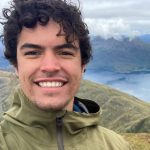 at Williams College and is now an M.A.-Ph.D. student in the UCLA Cotsen Institute of Archaeology. His research—developed through fieldwork ranging from archaeological excavations on the Peruvian central coast to contemporary studies of human-elephant conflict in Cambodia—examines interactions and categorizations of human and nonhuman environments in the Andes of South America. Gabriel’s M.A. focuses on contemporary Quechua understandings of Inka and Spanish Colonial history as related to botanical environments near Chinchero, Peru. He is interested in how ecologies of Andean-Amazonian transition zones in Peru and Bolivia relate to Inka border zones, and how contemporary Indigenous knowledge might inform archaeological research in those areas.
at Williams College and is now an M.A.-Ph.D. student in the UCLA Cotsen Institute of Archaeology. His research—developed through fieldwork ranging from archaeological excavations on the Peruvian central coast to contemporary studies of human-elephant conflict in Cambodia—examines interactions and categorizations of human and nonhuman environments in the Andes of South America. Gabriel’s M.A. focuses on contemporary Quechua understandings of Inka and Spanish Colonial history as related to botanical environments near Chinchero, Peru. He is interested in how ecologies of Andean-Amazonian transition zones in Peru and Bolivia relate to Inka border zones, and how contemporary Indigenous knowledge might inform archaeological research in those areas.
Sylvia Tongyan Qiu is a first year Ph.D student in art history at UCLA. 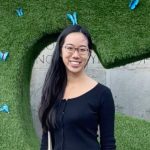 Her research focuses on the mobility of gemstones and natural products at the Qing court and their intersections with the early modern world. She is also interested in transcultural objects and the transmission of material knowledge. At UCLA, she received her MA in Art History. Her MA thesis explores the decorative devices on top of hats worn by members of the imperial family and officials of the Qing court known as hat finials and discusses their embeddedness in the production of space, meaning, and hierarchy. Prior to arriving at UCLA, she completed her undergraduate degree in History of Art at University College London. She held internships and volunteered at the Palace Museum, the British Museum, and Sir John Soane Museum, and UCCA. Her current project investigates a Qianlong era celestial globe inlaid with pearls and explores the complex material, religious, ideological, and metaphysical translations that took place in the making of this anomalous globe.
Her research focuses on the mobility of gemstones and natural products at the Qing court and their intersections with the early modern world. She is also interested in transcultural objects and the transmission of material knowledge. At UCLA, she received her MA in Art History. Her MA thesis explores the decorative devices on top of hats worn by members of the imperial family and officials of the Qing court known as hat finials and discusses their embeddedness in the production of space, meaning, and hierarchy. Prior to arriving at UCLA, she completed her undergraduate degree in History of Art at University College London. She held internships and volunteered at the Palace Museum, the British Museum, and Sir John Soane Museum, and UCCA. Her current project investigates a Qianlong era celestial globe inlaid with pearls and explores the complex material, religious, ideological, and metaphysical translations that took place in the making of this anomalous globe.
2022–23 Graduate Certificate Students
Moises Machuca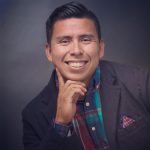 is a second year Ph.D student in the Department of Comparative Literature at UCLA. He received his BA in Literature and Philosophy from UCSC in 2020. His research reconceptualizes classical military theory of ancient Rome and the Early Modern period and its consequential imprint on modern U.S. military culture, its literature associated with war, and both its philosophical and theoretical frames of strategic warfare. More specifically, he is interested in comparing combatants’ experiences and descriptions of war found in letters, diaries, memoirs, and correspondences between the intellectual climates of the 15th century to the Enlightenment. Along with the Certificate for Early Modern Studies, Moises is completing the Experimental Critical Theory Certificate with Prof. Zrinka Stahujak.
is a second year Ph.D student in the Department of Comparative Literature at UCLA. He received his BA in Literature and Philosophy from UCSC in 2020. His research reconceptualizes classical military theory of ancient Rome and the Early Modern period and its consequential imprint on modern U.S. military culture, its literature associated with war, and both its philosophical and theoretical frames of strategic warfare. More specifically, he is interested in comparing combatants’ experiences and descriptions of war found in letters, diaries, memoirs, and correspondences between the intellectual climates of the 15th century to the Enlightenment. Along with the Certificate for Early Modern Studies, Moises is completing the Experimental Critical Theory Certificate with Prof. Zrinka Stahujak.
Emily Ostlander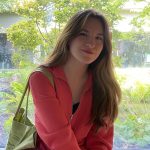 is a first year MA-Ph.D student in the UCLA Department of Art History. She completed her B.A. in both Art History and Urban Design & Architectural Studies at New York University, where she wrote her honors thesis on the androgynous representation of Saint John the Beloved during the European early modern period. In addition to her studies in New York, Emily has studied and worked internationally in Florence, Italy and Seoul, South Korea. Her combined experiences have inspired her to pursue the study of art history by following a transcultural narrative, specifically through topics such as the phenomenology and mysticism present in Buddhist and Christian early modern works of art.
is a first year MA-Ph.D student in the UCLA Department of Art History. She completed her B.A. in both Art History and Urban Design & Architectural Studies at New York University, where she wrote her honors thesis on the androgynous representation of Saint John the Beloved during the European early modern period. In addition to her studies in New York, Emily has studied and worked internationally in Florence, Italy and Seoul, South Korea. Her combined experiences have inspired her to pursue the study of art history by following a transcultural narrative, specifically through topics such as the phenomenology and mysticism present in Buddhist and Christian early modern works of art.
Rebecca Smith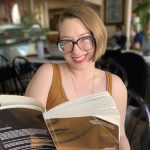 is a third year in the Comparative Literature doctoral program where she studies early modern and modern(ist) texts in Spanish, French, and Nahuatl. At UCLA, Rebecca has received her masters in Comparative Literature, the graduate certificate in Urban Humanities, and the FLAS award for University of Utah’s Nahuatl Summer Program. Before coming to UCLA, Rebecca received her bachelor’s degree in liberal arts from Sarah Lawrence College. She also studied at the Stockholm School of Economics, Pompeu Fabra University, and the National Autonomous University of Mexico. Currently, her work focuses on the feminization and racialization of Latin American spatialities with a special interest in Mexican modernist texts and the way the creation of the post-revolutionary mestizo identity is reflected, proscribed, and questioned in modernist constructions of space. Within her 20th century project, Rebecca is also tracing the way precolonial and colonial indigenous spatialities informed mestizo modernism through her work in 16th- and 17th-century Nahua maps.
is a third year in the Comparative Literature doctoral program where she studies early modern and modern(ist) texts in Spanish, French, and Nahuatl. At UCLA, Rebecca has received her masters in Comparative Literature, the graduate certificate in Urban Humanities, and the FLAS award for University of Utah’s Nahuatl Summer Program. Before coming to UCLA, Rebecca received her bachelor’s degree in liberal arts from Sarah Lawrence College. She also studied at the Stockholm School of Economics, Pompeu Fabra University, and the National Autonomous University of Mexico. Currently, her work focuses on the feminization and racialization of Latin American spatialities with a special interest in Mexican modernist texts and the way the creation of the post-revolutionary mestizo identity is reflected, proscribed, and questioned in modernist constructions of space. Within her 20th century project, Rebecca is also tracing the way precolonial and colonial indigenous spatialities informed mestizo modernism through her work in 16th- and 17th-century Nahua maps.
Billy Traylor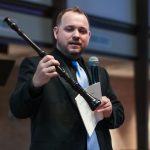 is a second year Ph.D. student in the Department of Musicology at UCLA. He holds bachelor’s and master’s degrees in music performance from the University of New Orleans and Northwestern State University of Louisiana, and a Master of Science in Information Studies from the University of Texas at Austin (archival and library science). An actively performing baroque oboist and recorder player, he is the founder and artistic director of the Austin Baroque Orchestra. His research is centered around early modern Iberia and Latin America, with particular interests in 17th-century Portuguese sacred music, the interaction between public and private musical life at the court of Ferdinand VI of Spain, and music at Oaxaca Cathedral in the 18th century.
is a second year Ph.D. student in the Department of Musicology at UCLA. He holds bachelor’s and master’s degrees in music performance from the University of New Orleans and Northwestern State University of Louisiana, and a Master of Science in Information Studies from the University of Texas at Austin (archival and library science). An actively performing baroque oboist and recorder player, he is the founder and artistic director of the Austin Baroque Orchestra. His research is centered around early modern Iberia and Latin America, with particular interests in 17th-century Portuguese sacred music, the interaction between public and private musical life at the court of Ferdinand VI of Spain, and music at Oaxaca Cathedral in the 18th century.
Syon Vasquez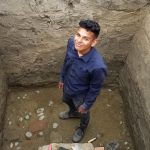 is a Ph.D. student in the Interdepartmental Archaeology Program at the University of California, Los Angeles. Prior to arriving at UCLA, Syon received his B.A. in anthropology from the University of South Florida. While completing his B.A. he participated in fieldwork at several Classic and Postclassic Maya sites in the southern Maya lowlands. Additionally, during his final year of undergraduate study, Syon completed a thesis project in which he analyzed ancient figural geoglyphs associated with the Paracas culture on the southern Andean coast. As part of his studies at UCLA, Syon is currently undertaking an M.A. thesis project in which he is examining African diaspora architecture during the colonial period in Belize. Syon serves as a co-organizer of the Architecture Working Group and is also a member of both the Andean Lab and Architecture Lab at the Cotsen Institute of Archaeology.
is a Ph.D. student in the Interdepartmental Archaeology Program at the University of California, Los Angeles. Prior to arriving at UCLA, Syon received his B.A. in anthropology from the University of South Florida. While completing his B.A. he participated in fieldwork at several Classic and Postclassic Maya sites in the southern Maya lowlands. Additionally, during his final year of undergraduate study, Syon completed a thesis project in which he analyzed ancient figural geoglyphs associated with the Paracas culture on the southern Andean coast. As part of his studies at UCLA, Syon is currently undertaking an M.A. thesis project in which he is examining African diaspora architecture during the colonial period in Belize. Syon serves as a co-organizer of the Architecture Working Group and is also a member of both the Andean Lab and Architecture Lab at the Cotsen Institute of Archaeology.
Sofia Yazpik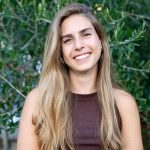 is a Ph.D student in the Department of History at the University of California, Los Angeles. She earned her Bachelor of Arts in Art History at the University of Texas at Austin. Her research focuses on the changes and movement of visual and material culture created in New Spain during the early modern period. She examines the relationship between, and translation of, pictorial and alphabetic writing systems in Mesoamerican colonial codices. She is interested in how Indigenous writers/painters incorporated Iberian traditions into their Pre-Columbian past to produce innovative forms of expression representative of their novel identities. Prior to graduate studies at UCLA, she worked in various cultural institutions, such as art museums, galleries, and university collections.
is a Ph.D student in the Department of History at the University of California, Los Angeles. She earned her Bachelor of Arts in Art History at the University of Texas at Austin. Her research focuses on the changes and movement of visual and material culture created in New Spain during the early modern period. She examines the relationship between, and translation of, pictorial and alphabetic writing systems in Mesoamerican colonial codices. She is interested in how Indigenous writers/painters incorporated Iberian traditions into their Pre-Columbian past to produce innovative forms of expression representative of their novel identities. Prior to graduate studies at UCLA, she worked in various cultural institutions, such as art museums, galleries, and university collections.
2021–22 Graduate Certificate Students
|
Rachel Schloss is a first year Ph.D student at the Cotsen Institute of Archaeology, UCLA. In 2020, she earned an M.Sc in Archaeology from the University of Toronto. Her doctoral research focuses on transformations and continuities in the meaning of Inca architecture from the 15th to 18th centuries. In particular, she explores how building materials, technologies, and place-making practices enabled and symbolized Inca imperialism, and how the same Indigenous architectural corpus was subsequently co-opted to inform and facilitate the colonial practices of Iberian invaders. Rachel has previously completed archaeological fieldwork in coastal Peru and the Galilee region of Israel. |
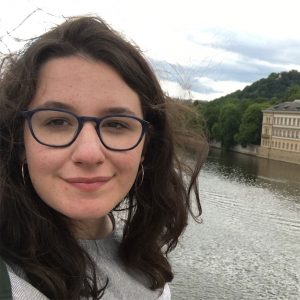 |
|
Erin Severson |
|
|
Kevin Torres-Spicer is an incoming M.A./Ph.D. student in the Department of Art History. He received his B.A. in Art History from California State Polytechnic University, Pomona. He has held positions at several institutions such as the J. Paul Getty Museum, the Smithsonian American Art Museum, and the Dallas Museum of Art, among others. Interested in materiality, Kevin hopes to explore the complexities of the entanglement of Indigenous American and Arabic traditions by examining architectural change and influences in the sixteenth century Andes. |
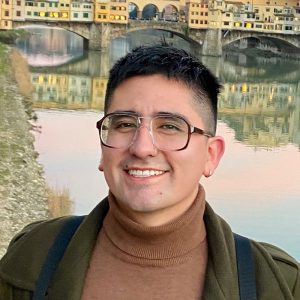 |
2020–21 Graduate Certificate Students
|
Drew Erin Becker Lash is a first-year Ph.D. student in the Department of Art History at UCLA. She previously earned masters’ degrees at Columbia University in Art History in 2018, and at Universidad Autónoma de Madrid in Estudios Artísticos, Literarios, y de la Cultura in 2016. She completed her bachelor’s degree at Johns Hopkins in Art History and International Studies in 2014. Most recently, she worked as a Research Associate at the Art Institute of Chicago in the European Painting and Sculpture department. Her doctoral research will focus on the painting of the wider Hapsburg Empire in the seventeenth century, concentrating primarily on that of Spain and Italy. She has held internships at The Frick Collection, the Museo Nacional del Prado, LACMA, and The Phillips Collection. |
 |
|
Chase Caldwell Smith is a first-year PhD student in the UCLA History Department. Previously, he earned a BA in History from the University of Cambridge in 2017 and an MSt in Global and Imperial History from the University of Oxford in 2018. His research interests center thematically on histories of cultural encounters, race and identity, religious conversion, and knowledge production, and geographically on the early modern Iberian empires in maritime Southeast Asia, with attention to connections with regions including Latin America, South Asia, and Europe. Prior to beginning his graduate studies at UCLA, he pursued an internship at BFM Media in Kuala Lumpur, during which he produced an eight-part mini-series for radio on selected subjects, places, and themes in Malaysian history, and internships at Columbia University Press, W. W. Norton & Company, and the New-York Historical Society. He currently co-hosts the Global History Podcast, a digital history project which features interviews with scholars on research in early modern global history. |
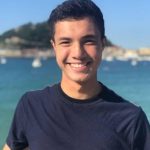 |
|
Cynthia Fang is a second year MA-Ph.D. student in the Department of Art History, and her research focuses on transcultural connections between early modern Europe and China. Her recent project considers the potential of ornament and its social and geopolitical dimensions in still-life pictures to reassess early modern connections across and between cultures. Prior to graduate studies at UCLA, Cynthia received her B.F.A in Art History with concentrations in Painting and Curatorial Studies at MICA. |
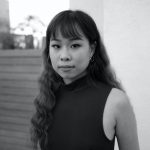 |
|
Shannon Forest is a Ph.D. student in the Department of English at UCLA, prior to which she earned a B.A. from Bard College in Global Studies. Conceived broadly, her current, transdisciplinary work considers receptions of philosophy at moments of epistemic rupture. This work traces the tectonic shifts in cultural conceptions of history and memory that shaped the utopian and dystopian discourses of the 17th and 20th centuries. To these ends, Shannon studies continental philosophy outside of her department and, in addition to the Certificate for Early Modern Studies, is completing the Experimental Critical Theory Certificate with Prof. Ken Reinhard. Her most recent publication, entitled “Challenging Secularity’s Posthistorical “Destination”: J.M. Coetzee’s Radical Openness in the Jesus Novels,” appeared in the Fall 2019 issue of the Journal of Modern Literature. |
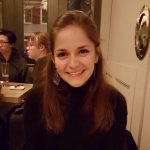 |

